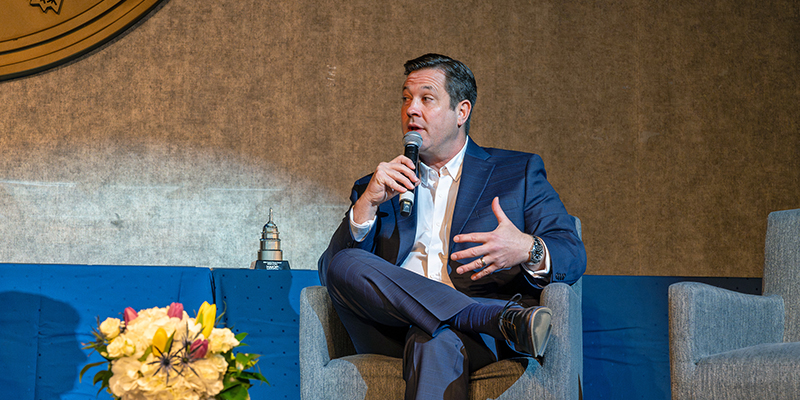The COVID-19 pandemic has created challenging conditions for commercial real estate, particularly for speculative projects and for sectors that are more exposed to cyclical risk. After an initial shock in the spring that nearly halted deal activity, investors have resumed building acquisitions and new development projects, but are most often interested in core real estate properties with sound long-term prospects.
A panel of investors and developers discussed trends in core real estate performance and how their firms have weathered the pandemic at CRE.Converge Virtual 2020. Their experiences underscore the importance of prudential investment strategies, proactive asset management and strong relationships between developers, investors, lenders and tenants.
Shepherding Portfolios Through the Crisis
Panelists shared how the pandemic led them to rapidly shift their focus to managing existing assets and closing real estate deals that were already underway. Brian Pieracci, managing director at Heitman, noted that his firm had planned to deploy capital across a variety of asset classes, but after March 13, immediately shifted focus to evaluating the properties within its existing portfolio and re-examining the deals it had already initiated before closing them. By June, the firm was able to start deploying some of its discretionary capital, but has only recently seen interest in new deals from investors in its non-discretionary accounts, with most investors interested in industrial assets.
Nicholas Pell, president and chief investment officer at Link Logistics Real Estate, also recounted that his company had been focused on portfolio management and identifying an appropriate risk premium for new deals since March. For several months, the firm’s management team would join phone calls each morning to discuss their accounts receivable. Although they spent more time managing existing properties than they were accustomed to, the process helped improve their portfolio’s performance.
Jim Clewlow, chief investment officer and executive vice president at CenterPoint Properties, noted that although no two recessions are the same, his company had been preparing for a possible downturn by emphasizing quality investments and careful portfolio management. CenterPoint’s focus on quality tenants in good markets, portfolio diversification and organic growth has translated to strong rent collections and balance sheets despite the downturn.
Investors Remain Attracted to Core Assets
Panelists agreed that investors are currently seeking opportunities in industrial real estate and are carefully weighing investments in other core assets. Pieracci observed that although investors were theoretically interested in investing in distressed assets, they were avoiding the sectors hit hardest by the pandemic, such as hotels and retail properties. Jose McNeill, CEO at McNeill Real Estate Services, said that industrial assets have performed well, noting that large build-to-suit facilities in California’s Central Valley have attracted significant investment. Pell noted that foreign capital has been bidding on industrial assets, though they are primarily focused on larger transactions.
Pieracci observed that cap rates for core properties range between 3.5% and around 5%, depending on the property type and geographic market. Pricing for high-rise urban assets has been discounted, but there has been greater investor appetite for suburban assets. Clewlow agreed that quality assets continue to attract investor interest, noting that he saw yields compress for well-located property in Los Angeles as investors sought opportunities to invest dollars in core or core-plus assets.
Panelists observed that Amazon has continued to rapidly expand investment in buildings that are tailored to its unique needs while also expanding leasing of existing facilities. Pell says that Amazon has been a wonderful customer for Link and has created opportunities for developers and industrial building owners across markets and building types: “No other company has ever built out a network like this so quickly.”
However, they also noted that Amazon’s rapid expansion has created concerns about how exposed individual firms may be to the company’s performance, and whether owners of the company’s highly specialized build-to-suits would be able to repurpose these buildings in the future. “How much Amazon do you want in your portfolio?” asked Pieracci. It’s a question that Heitman has raised when evaluating deals, though the firm has not yet approached a threshold where exposure to Amazon could become a serious concern.
Relationships are Key
Panelists frequently returned to the importance of developing and maintaining strong relationships as the key to surviving and thriving through the real estate market’s ups and downs. Strong relationships with tenants have allowed firms to quickly evaluate their portfolios’ health. Relationships are also clearly important to identifying and closing new deals. Pell said that being able to talk with someone you know and trust is particularly important during periods of market turbulence, when conditions can change rapidly. He noted there have been times in recent negotiations when both sides have had to rely on their ability to trust each other in order to close a deal.
This post is brought to you by JLL, the Social Media and Conference Blog sponsor of NAIOP’s CRE.Converge Virtual 2020. Learn more about JLL at www.us.jll.com or www.jll.ca.















